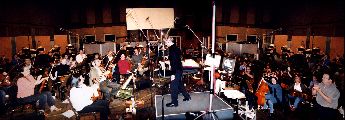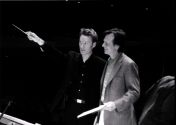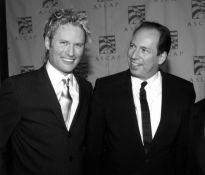|
Versión en español
B S: Before start, thank you for give us the chance to talk with you.
To us, it's such a privilege to share with you a viewing of your career. S: Before start, thank you for give us the chance to talk with you.
To us, it's such a privilege to share with you a viewing of your career.
BT:My pleasure.
BS: First, why did you enter into the film music world, and when did that
happen?
BT:I entered the film music world in about 1996 when I scored a film
called “Bartender”. Since I was a young boy I enjoyed watching films
and was influenced a great deal by my grandparents. My grandfather
(Walter Tyler) was an art director for films and my grandmother was a
terrific pianist. I started writing my own music at a young age and
began writing score music in my teens. It wasn’t till after graduate
school that I got the chance I had been waiting for. Director Gabe
Torres simply enjoyed my music and asked me to score his film.
BS: Your first important work (and today, cult film) was "Six
String Samurai". Why did you decide to use surf music on it? It was a film in
the Mad Max style, with desert everywhere...
BT:Director Lance Mungia had a lot to do with the musical influences we
referred to. It was a film with a post-apocalyptic story but the main
character (Buddy) was an alternate reality doppelganger to Buddy Holly
if he lived through the 50s. The idea was that rock music stopped at
its 1960s infancy but was infused with Russian music (since the
Russians occupied North America after World War III). I know it sounds
strange... and it is!
BS: After that, you made a few projects that were Thrillers. We can
pick "The 4th Floor" starred by William Hurt and Juliette Lewis,
and "Shadow Hours" with Peter Weller. Can you talk us a bit about those
works?
BT: “The 4th Floor” was a great musical journey for me in that
I made an effort to push the boundaries of where, in my mind, atonal and tonal
music met. Where is the line? That is the question I wanted to answer.
It was experimental yet it turned out to be a very thematic score.
Atonal meets melody. “Shadow Hours” was a dark movie about the
underground club scene here in LA and was a re-telling of “Faust”. So
for that film I recorded all industrial underground music. The music
had a Faustian quality I suppose.
BS: In "Panic" and "Terror Tract" you could put music to two films of the missed Jon Ritter. What was the feeling of those projects?
BT:“Panic” is one of my favorite films. I wrote a score I think is still
one of my best. The director Henry Bromell made such wide film with
wide shots of Los Angeles. Very open and understated. That is what I
tried to do with the score. It was minimalist with piano and orchestra
but it needed to convey the painful relationship between Donald
Sutherland and William H. Macy. John Ritter was terrific in “Panic” as
the psychiatrist and as the real estate agent in “Terror Tract”.
B S: Truly, "Terror
Tract" is a surprising soundtrack, with a main theme
that is really strong, and that feels strange, since the film was a low
budget movie. Why did you choose to compose a so big sound for that one? S: Truly, "Terror
Tract" is a surprising soundtrack, with a main theme
that is really strong, and that feels strange, since the film was a low
budget movie. Why did you choose to compose a so big sound for that one?
BT:As for “Terror Tract”, I rarely have had so much fun scoring a film.
There were 2 directors (Lance Dreesen and Clint Hutchison) and they
were terrific. True film fans. It is my most bombastic score with
pounding orchestra in the tradition of 1950s thrillers. Huge brass.
Choir. Big strings. Big percussion. The score was the anti-thesis of
“Panic”. The funny thing was that I wrote them at the same time and
conducted the orchestras only days apart. As for the big sound on a
small budget, I had to make the orchestra sound much bigger than they
were and I did that through careful composing and orchestral technique.
It sounds more simple than it was – believe me! I didn’t sleep much
during that time.
BS: You have worked in a few TV series, such as "Living
in Captivity", "Level 9", "Last Call" with Jeremy Irons and Sissy Spacek
or "Enterprise" with Scott Bakula. Do you work in the same way for the
cinema and for TV, or you approach the work in a different way? (not
counting the instrumentation differences due budget restrictions)
BT:I approach the scores in TV no differently than when I write for a
movie. I wouldn’t know how to approach it differently. Scoring should
always follow the picture. The picture is its master. My job is to
enhance the story as much as I possibly can.
BS: You have said in some interviews that you are a "Star
Trek" fan, so,
is that the reason why you have preference towards the fantasy/sci-fi
genre?
BT:I am a huge sci-fi fan. Actually, I am somewhat of a movie fanatic. My
DVD shopping is completely out of control!
BS: If you could choose to score "Star Wars", "Star
Trek" or "The Lord of the
Rings" series, which one you would you pick in musical terms?
BT:I have no idea. Classics all. The original Star Wars trilogy is my
boyhood favorite and those first two films (Star Wars and Empire) are
still mind blowing. The LOTR trilogy is fantastic, and I loved Wrath of
Khan.
B S: "Frailty" was
really a turning point in your career. Truly, watching the movie in the cinema
I felt myself hooked to the story directed by
Bill Paxton. The musical universe that you created was totally
oppressive, and you became nominated to the "Discovery of the year" in
the World Soundtrack Awards. What can you explain about this terrific
work? S: "Frailty" was
really a turning point in your career. Truly, watching the movie in the cinema
I felt myself hooked to the story directed by
Bill Paxton. The musical universe that you created was totally
oppressive, and you became nominated to the "Discovery of the year" in
the World Soundtrack Awards. What can you explain about this terrific
work?
BT:Frailty was one of those wonderful experiences. Bill is amazing as a
director. For me, Frailty was a score done the old fashioned way. I
spent day and night on the basics: composing the themes and writing
notes. Bill and I communicated through the ways of the old masters like
Hitch and Herrmann. We favored previewing themes on the piano instead
of having the computer churn out midi mock ups. It was bliss. I would
sit there with Bill and play the piano as he listened. The orchestra
was recorded in a huge hall for that gothic flavor of old.
BS: "Bubba Ho-Tep" is a madness created by the "Phantasm" author, Don Coscarelli, with the great Bruce Campbell as Elvis.
A so original story
that can be compared with the one in "Six String Samurai". Did you
composed both films with a similar approach?
BT:In fact, yes I did. Both films are so wild and original. Scoring Bubba
was a nice detour into my roots which was independent film making. I
played all of the instruments myself and sang the choir parts. It was
just like when I scored “Six-String”.
BS: "Vampires: Los Muertos" is another work of you that I love. It's a
follow up of the John Carpenter movie, but now the protagonists are
different. Did you worked with the obligation of keep the "Carpenter sound" of
the first movie, or you had total freedom?
BT:In fact, I made a conscious decision to not even listen to the original
score. I saw the film years before and I stayed away so I would not be
influenced. Tommy wanted this to be its own creation. In fact, its one
of the few John Carpenter scores I don’t know. To this day, I don’t
know if they even sound remotely alike.
BS: According my point of view, "Darkness
Falls" is a totally failed
movie, where your music stands out of any other movie element. The
power of the orchestra is a already a trademark, but... don't you think
that it can damage the movie? In the meaning that a so big soundtrack
distracts the spectator.
BT:Gigantic scores can and do detract from films if they are not right
tonally. I think that with “Darkness Falls” it is a matter of where the
viewer is coming from. It is a monster movie. If the audience member
doesn’t buy the premise then no score can help it.
BS: I feel similarities (though not when it comes to instrumentation)
between the main theme of "Frailty" and the main theme of "Darkness
Falls", was it something pretended?
BT:I suppose since they are both over shots of historical records and both
main title visual sequences told a story of death and murder in the
20th Century in small town America the music naturally evoked a similar
sound..
BS: You have said in some interviews that you like Goldsmith. In "The
Hunted" the main sound is percussive, excellent... and at the same time it
sounds very "Goldsmith". That approach to his style, was a decission of
you, or of William Friedkin, who had already worked with Goldsmith?
BT:I am a percussionist so percussion is something that often dominates my
action music. The idea for The Hunted was that all of the sections of
the orchestra would play in a percussion-like manner. The themes were
based on rhythm more than melody. As for Friedkin, he has an
encyclopedic knowledge of music and was a great resource while
composing the score.
BS: I wanted this question to arrive: "Children
of Dune" might be one of
the best soundtracks of 2003, and here in Spain you have got a lot
of new fans thanks to it. Can you tell us a bit about this score?
BT:I am so happy that people enjoy the score as much as they do. The music
for Children of Dune means a lot to me. I wrote it from the heart.
Composing music is not merely a technical exercise. Composing is a
deeply emotional experience and when someone is moved by your music, it
is very gratifying. I was touched by the tragedy of the story. The
director Greg Yaitanes is a dear friend and he gave me the latitude to
write a score that evoked passion and resonance. There are 3 components
of score in COD. There is a large amount of anthemic orchestral music
with big themes and aggressive orchestration. There is the otherworldly
ensemble music and then there was the romantic component to the score
which was either orchestral or soloistic.
B S: Many
fans are telling that in "Children of Dune" there are a few
influences of the soundtrack for "Gladiator" by Hans Zimmer. What
is your opinion of that? S: Many
fans are telling that in "Children of Dune" there are a few
influences of the soundtrack for "Gladiator" by Hans Zimmer. What
is your opinion of that?
BT:That is fine with me. Music is subjective. I tend to write in a vacuum
with no temp score so influences on my writing is more by osmosis than
anything else. The ensemble world music component of the score, as with
“Gladiator”, owes influence from Peter Gabriel’s “Passion” score which
owes its heritage to both medieval canonical music as well as ancient
Indian folk music.
BS: I had the feeling that there is in that soundtrack an homage to the
theme by Brian Eno to the Dune by David Lynch... am I wrong? What do
you think of the Toto's soundtrack for that movie? And the Revell's one
for the first TV series?
BT:You are right! I used a similar sound to the “Prophecy Theme” from the
original soundtrack (I believe it is a Mellotron and Prophecy V keyboard
layered together). It was my way of connecting the two stories
musically. I am one of the few people who loved the original movie by
Lynch as well as that soundtrack. I bought the record back in 84 and
played it all of the time. As for Graeme's score, I enjoyed it while
watching the original Sci Fi miniseries.
BS: Thanks to "Timeline", you are in the point of view after replace a
master, Jerry Goldsmith. How did you get the news about the change, and
how did you decide to take part on it?
BT:I heard about the Jerry news through a friend and as a huge Jerry
Goldsmith fan I was disappointed. I was shocked and honored to be asked
to score the film by Richard Donner. I did my absolute best as a
tribute to one of my favorite composers and a director I had long
admired. It was a wonderful experience.
BS: Have you heard the score that Goldsmith composed?
BT:I am sorry to say I have not.
B S: "Timeline" is
an excellent work that has convinced the Spanish fans that "Children of
Dune" was not a mirage. Again, you surpass the images
and show that the power of the orchestra became your trademark. What is
your best remembrance of the work in this film? S: "Timeline" is
an excellent work that has convinced the Spanish fans that "Children of
Dune" was not a mirage. Again, you surpass the images
and show that the power of the orchestra became your trademark. What is
your best remembrance of the work in this film?
BT:Thank you very much! My fondest memory was conducting the orchestra to
one of the main themes and it was sounding great out there on the
podium. After the cue finished I turned around to see the entire
recording booth with Donner and the producers cheering. Then the
orchestra cheered. I couldn’t believe it. I was very grateful.
BS: In "Godsend", you join Nick Hamm, director of "The
Hole", in a science fiction and horror story starring Robert DeNiro
about clonation. How have you approached this project and what kind of
ideas you have for the music?
BT:I wrote the score for orchestra and the melodic content is really wild
and textural. I wanted it to reflect the scientific spirit of the movie
so it has a distinctly modern edge to it. It was an invigorating film.
BS: "Final Cut" is a film starred by Robin Williams, also science
fiction. What are you preparing for this project?
BT:I am writing that score as we speak. It is very thematic. Although it
is a science fiction movie, the feel is more like a 1930s mystery than
a space extravaganza. It is understated and lonely. But there is a
pulsing energy to the score that becomes apparent as the movie
proceeds. It is an amazing film and a great story.
BS: "Sahara" is an adaptation from a Clive Cusser's novel. Have you
already started to work on it?
BT:I am presently scoring "Final Cut" but I am really excited about "Sahara".
BS: The biggest amount of your work is focused on the field of the
fantasy and science fiction. Do you feel that you are typecasted in
that genre or you just like this kind of music/movies? Would you like
to compose for a drama, a romantic comedy or something more specific
such as a western or a pirates movie?
BT:In fact, I have scored an even amount of dramas as fantasy or science
fiction films. I enjoy dramas tremendously. I have scored a number of
romantic films and maybe 4 or 5 comedies. Those were really great to
do. The comedies “Perfect Opposites” and “The Big Empty” will be out in
2004. I would love to score a western. That would be great fun.
BS: To end, what would you tell to the Spanish fans that are reading this
right now?
BT:To anyone who enjoys my music I must say thank you from the bottom of
my heart. I am truly grateful.
BS: Thank you for your time. It has been a pleasure to have you with us in
BSO Spirit.
BT:Thank you. Catch you later!
Interview by DDBSpawn
Translation by Rubén Sánchez
|





